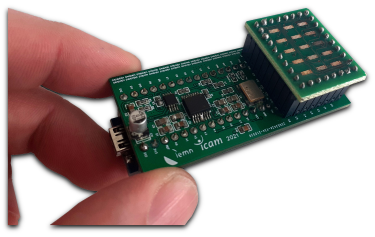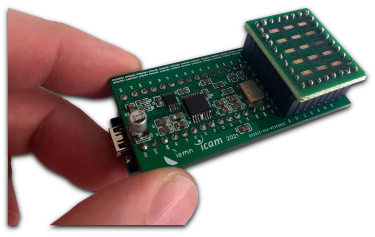









Abstract: Advances on System-On-Chip and organic sensors allows the development of miniaturized impedance measurement hardware for gas monitoring in IoT. In this work, we present the development of miniaturized, multiplexed, and connected platform for impedance sp ectroscopy. Designed for online measurements and adapted to wireless network architectures, our platform has been tested and optimized to be used for multi-selective chemical organic sensor nodes. Our designed circuit is built from low cost and low power consumption microelectronics components providing real time acquisition. The proposed system is based on ESP32 Microcontroller enabling the management of an impedance network analyzer AD5933 (Analog Devices, Norwood, MA, USA) through its I2C interface. Our system benefits from two multiplexer components allowing calibration process and the interface of 15 conductimetric sensors with fast acquisition (less than 90 ms per acquisition). The paper describes the microelectronics design, the impedance respon se over time, the measurement's sensitivity and accuracy and the testing of the platform with embedded chemical sensors for gas classification and recognition.
Routier L., Westrelin A., Cerveaux A., Foulon P., Louis G., Horlac'h T., Lmimouni K., Pecqueur S., Hafsi B.


 Abstract: Advances on System-On-Chip and organic sensors allows the development of miniaturized impedance measurement hardware for gas monitoring in IoT. In this work, we present the development of miniaturized, multiplexed, and connected platform for impedance sp ectroscopy. Designed for online measurements and adapted to wireless network architectures, our platform has been tested and optimized to be used for multi-selective chemical organic sensor nodes. Our designed circuit is built from low cost and low power consumption (250 mW) microelectronics components that achieve long duration operability (5 days and 16 HRS) without compromising on sensor measurement accuracy and precision. We used the well-known impedance network analyzer AD5933 (Analog Devices, Norw ood, MA, USA) chip which can measure a spectrum of impedances in the range 5 Hz to 100 kHz. The proposed system is based on ESP32-C3 Microcontroller enabling the management of the AD5933 through its I2C interface. Our system benefits from two multiplexer components CD74HC4067 allowing calibration process and the interface of 15 conductimetric sensors with real time acquisition (less than 90 ms per acquisition). The system is capable of relaying information through the network for data analysis and stora ge. The paper describes the microelectronics design, the impedance response over time, the measurement's sensitivity and accuracy and the testing of the platform with embedded chemical sensors for gas classification and recognition.
Abstract: Advances on System-On-Chip and organic sensors allows the development of miniaturized impedance measurement hardware for gas monitoring in IoT. In this work, we present the development of miniaturized, multiplexed, and connected platform for impedance sp ectroscopy. Designed for online measurements and adapted to wireless network architectures, our platform has been tested and optimized to be used for multi-selective chemical organic sensor nodes. Our designed circuit is built from low cost and low power consumption (250 mW) microelectronics components that achieve long duration operability (5 days and 16 HRS) without compromising on sensor measurement accuracy and precision. We used the well-known impedance network analyzer AD5933 (Analog Devices, Norw ood, MA, USA) chip which can measure a spectrum of impedances in the range 5 Hz to 100 kHz. The proposed system is based on ESP32-C3 Microcontroller enabling the management of the AD5933 through its I2C interface. Our system benefits from two multiplexer components CD74HC4067 allowing calibration process and the interface of 15 conductimetric sensors with real time acquisition (less than 90 ms per acquisition). The system is capable of relaying information through the network for data analysis and stora ge. The paper describes the microelectronics design, the impedance response over time, the measurement's sensitivity and accuracy and the testing of the platform with embedded chemical sensors for gas classification and recognition.
Routier L., Westrelin A., Cerveaux A., Louis G., Horlac'h T., Foulon P., Lmimouni K., Pecqueur S., Hafsi B.*

 Abstract: Advances on System-On-Chip and organic sensors allows the development of miniaturized impedance measurement hardware for gas monitoring in IoT. In this work, we present the development of miniaturized, multiplexed, and connected platform for impedance sp ectroscopy. Designed for online measurements and adapted to wireless network architectures, our platform has been tested and optimized to be used for multi-selective chemical organic sensor nodes. Our designed circuit is built from low cost and low power consumption microelectronics components providing real time acquisition. The proposed system is based on ESP32 Microcontroller enabling the management of an impedance network analyzer AD5933 (Analog Devices, Norwood, MA, USA) through its I2C interface. Our system benefits from two multiplexer components allowing calibration process and the interface of 15 conductimetric sensors with fast acquisition (less than 90 ms per acquisition). The paper describes the microelectronics design, the impedance respon se over time, the measurement's sensitivity and accuracy and the testing of the platform with embedded chemical sensors for gas classification and recognition.
Abstract: Advances on System-On-Chip and organic sensors allows the development of miniaturized impedance measurement hardware for gas monitoring in IoT. In this work, we present the development of miniaturized, multiplexed, and connected platform for impedance sp ectroscopy. Designed for online measurements and adapted to wireless network architectures, our platform has been tested and optimized to be used for multi-selective chemical organic sensor nodes. Our designed circuit is built from low cost and low power consumption microelectronics components providing real time acquisition. The proposed system is based on ESP32 Microcontroller enabling the management of an impedance network analyzer AD5933 (Analog Devices, Norwood, MA, USA) through its I2C interface. Our system benefits from two multiplexer components allowing calibration process and the interface of 15 conductimetric sensors with fast acquisition (less than 90 ms per acquisition). The paper describes the microelectronics design, the impedance respon se over time, the measurement's sensitivity and accuracy and the testing of the platform with embedded chemical sensors for gas classification and recognition.
Routier L., Westrelin A., Cerveaux A., Foulon P., Louis G., Horlac'h T., Lmimouni K., Pecqueur S., Hafsi B.*
© 2019-2025 Sébastien Pecqueur